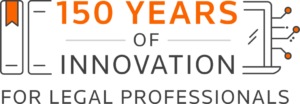Thomson Reuters Celebrates 150 Years: Tom Leighton on Relationship Building with the Judiciary

Thomson Reuters is commemorating 150 years of customer partnership and innovation to honor the 1872 founding of John B. West Publisher and Book Seller. West’s innovative spirit lives on in Westlaw – a product that still carries his name – and in the AI-driven products and legal research technology tools used by legal professionals worldwide.
Our Legal Current series features voices across Thomson Reuters sharing how West’s legacy of customer partnership and innovation endures today. We hear today from Tom Leighton, vice president, Content Acquisition Relationships, who has worked at Thomson Reuters for 33 years.
Helping administer justice
Much of Leighton’s time with Thomson Reuters has focused on building relationships with the judiciary.
“Working with the judiciary for 30-plus years means I’ve been the beneficiary of the incredible work that everyone did before me, and continues to do at Thomson Reuters,” Leighton said. “My team and I have instant credibility whenever we meet with judges because of the extraordinary reputation the company has and the great products we’ve always delivered to customers.”
 Leighton has leveraged this into opportunities to collaborate with the judiciary.
Leighton has leveraged this into opportunities to collaborate with the judiciary.
“Judges rely heavily on Thomson Reuters products,” he noted. “Without exception, I have found judges to be helpful and interested in giving us feedback about our products.”
He said this includes judges’ feedback on product demonstrations as well as casual conversations where they “bounce ideas off” one another regarding issues such as handling of sealed cases.
“They’re insightful people, and they often come up with valuable things to tell us about the product and our processes,” Leighton added. “The judges understand how important our tools have been in helping them administer justice in the U.S. and elsewhere around the world.”
He added, “They have very high expectations for us, which is a good thing, and we hold ourselves to that high standard. And they realize the benefits of providing feedback: it gives them improved tools to do their jobs effectively.”
Leighton noted Thomson Reuters continually supports issues that are important to judges.
“We’ve gotten involved with initiatives and organizations that promote judicial education, access to justice and a fair, impartial, and independent judiciary,” he said. “We work closely with groups like the American Inns of Court that advance the rule of law by achieving the highest levels of professionalism for lawyers and judges. And the judges I serve with on various nonprofit boards really appreciate our commitment to access to justice and the rule of law around the world and that helps create a strong partnership.”
Books for Africa

Rule-of-law efforts that Thomson Reuters has long supported include Books for Africa and the Jack Mason Law & Democracy Initiative, for which Leighton serves on the advisory board. (Read ABA Journal’s coverage of the company’s involvement with Books for Africa.)
“For the past few years, I’ve gotten more involved with the Jack Mason Law & Democracy Initiative, through which we donate law libraries to various African countries – both government entities and NGOs,” Leighton explained. “We’re up to 117 libraries donated, and we’re on course to donate about 10 libraries a year. I’m glad to help carry on the great work that my colleagues Tom Pfeiffer, Sharon Sayles-Belton, John Elstad, and others have been committed to.”
Leighton traveled to Ghana recently for the Commonwealth Magistrates and Judges Conference. During his trip, he was able to visit three organizations that received law libraries through the program: the Ghana Supreme Court, the Ghana Book Trust, and the Ghana Federation of Women Lawyers.
“It was amazing to see first-hand the benefits the books provide to them,” Leighton said. “It’s hard to imagine here in the U.S., where books are plentiful. But in many parts of Africa books are scarce, and legal resources are scarce. So, this really helps them in their work.”
He described the impact the program and the books are making.
“It helps these organizations do high-level legal research for their clients and constituents,” Leighton said. “It also gives them credibility because their clients walk in and see they have modern legal publications – the tools of the trade – on their shelves.”
He explained how the law books provide a starting point.
“There isn’t a long history of established law like we’ve got in the U.S., Canada and the UK,” Leighton said. “They can use our law as a basis to begin their own jurisprudence.”
Leighton said at the Commonwealth Magistrates and Judges Conference, judges introduced themselves to him and said they had heard about the law books program. That’s how he learned about courts in Cameroon and Nigeria in dire need of books. Leighton said conferences like this can serve as an opportunity to identify entities in need and help determine where to send the next law libraries.
Read more about the Thomson Reuters legacy and watch Legal Current for additional stories in the coming weeks.